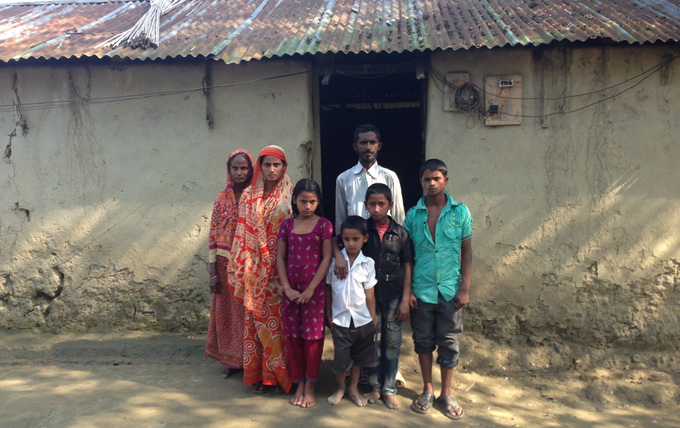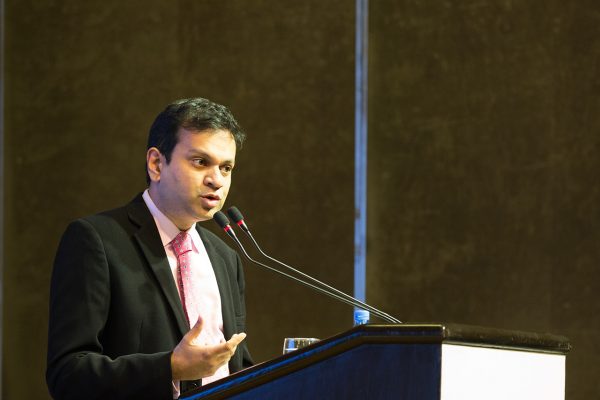“My daughter used to work so hard”
Reading Time: 4 minutes
The woman was crying and saying something in an incomprehensible manner. I was sitting there, a couple of feet away, wondering what I had said wrong. The man sitting beside her didn’t react to her sudden burst of tears – she is his wife and he has gotten used to seeing her like this. My colleague Lusana and the BBC documentary producer Sarah both went quiet for a while.

Morjina’s mother-in-law (far left), Morjina (2nd from left) and Aziz (back) with their four surviving children. [Photo by: Zara Hayes]
Eventually the woman, Morjina, gathered herself and started wiping her tears off with the corner of her saree. Aziz, her husband, suggested that we sit inside the house so there would not be as many people inside, it would be comfortable for us to talk to them there. Our comfort? It’s their daughter who had died not even a year ago, it was them who never even got to bury her dead body because they never found the body in the first place and they were concerned about our comfort? Are they so accustomed to the pain that they don’t even feel it? We are the fancy city folks, discomfort can only be felt by us.
Rekha Khatun was their second born, second among her five siblings. She died during the Rana Plaza building collapse. She was only 18 and she was the family’s main breadwinner. “My daughter used to work so hard – long shifts, virtually no vacations – but she didn’t mind anything. She was earning for her family, she wanted to give her brothers and sisters a better life than hers,” Morjina was saying. Her father showed me a bunch of forms and ID cards. He couldn’t read or write, but he had made every card, filled every form, and done everything what others told him to do. He is desperate; even with Rekha’s elder sister married in India and Rekha gone, he still has five mouths in his family to feed. He earns only BDT 1,500 (USD 19) a month – it’s not enough. Oh, and his left hand is only half functional, he fell off the roof of a bus after getting caught in overhead electricity lines.
The house they are now living in belongs to Aziz’s brother. The family barely earn enough to manage food twice a day; sometimes they don’t. Aziz sells vegetables by the side of the nearby highway and his eldest son, Mithun, only 15, is working full-time wherever he can get work. Morjina runs errands to nearby houses and earns what meagre amount she can manage.Their favourite daughter is gone, but this is not the only thing they are struggling with, their very existence is at stake.
Aziz and Morjina moved to Savar from their village in Mymensingh seven to eight years ago. Rekha was only 10 back then. Aziz started working as a rickshaw puller and Morjina joined a nearby garments factory. In time, they had more kids and it was getting difficult to maintain the family. Aziz, never a very healthy man, never went to school and married when he was a teenager. His body couldn’t handle hard labour and his lack of education meant he could never support the family on his own. Rekha grew up seeing all this and somehow developed a very strong sense of determination within herself to change her family’s future. Rekha used to work as an apprentice at her mother’s factory to learn how to handle the machinery. With the experience she had, she applied for a job in a bigger garments factory in Rana Plaza and got the job. Her basic salary was BDT 4,100 (USD 52), but there were always options for working overtime and on Fridays (the weekend) – at the end of the month it amounted to BDT 8,000-9,000 (USD 103-116).
“I was so proud of my daughter, she was earning a lot of money, was doing well in her job but still she used to come straight home from work. No one in the neighbourhood could say one bad thing about my daughter,” Aziz said. I could still feel the pride in Rekha’s father’s voice. Rekha had plans to pull the family out of poverty and set up a small business for her father in the village so that they could all move back and her little brothers and sisters would have a better, comfortable life. The only times she used to get angry was when her parents talked about her marriage. “Not so soon,” she used to say, “I am working for a better future for my brothers and sisters, I need time.” Then one day Rana Plaza happened. That morning on 24 April 2013 was the last time Aziz and Morjina saw Rekha. The first few days were spent in frantic chase of all potential leads; Aziz and Morjina went wherever there was a new body taken out of the rubble, in every nearby hospital. Their family members came from their village and helped in searching. Eventually it all ended, with no results. Aziz went to BGMEA officials and stored his blood sample for DNA testing but he doesn’t even understand that to cross check, they would need another person’s DNA sample. Rekha’s body was never found.
We tell them BRAC would help them eventually; they were on our list of most vulnerable families following the Rana Plaza collapse. They listen without much hope – they have been promised support before and it never came. On our way back to our car, Aziz and his family offer us tea at his brother’s tea stall. We agree on one condition – that we would pay the bill at the end. But as we had predicted, at the end Aziz’s brother made a strong effort not to take any money. We were their mehman (guests) after all.
Rakib Mohammad Avi is the partnership manager at BRAC in Dhaka, Bangladesh.
A week after BRAC’s visit to Rekha’s family, Aziz came to Dhaka for training in how to open a small business. With a grant of BDT 23,000 (USD 295), he will open a retail shop next to his brother’s tea stall. A BBC documentary, to be broadcast on the one year anniversary of the Rana Plaza building collapse, features Rekha and her family’s story.





